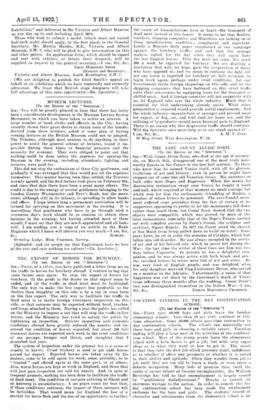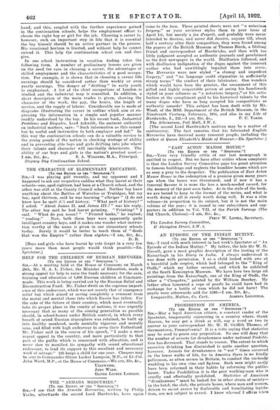VOCATION FINDING IN THE DAY CONTINUATION SCHOOL.
[To TEE EDITOR OF TAR " SPECTATOR.")
SIR,—Every year 60,000 boys and girls leave the London elementary schools. Less than 20 per cent. continue in full- time education. Some 50,000 obtain part-time instruction in day continuation schools. The schools can materially aid these boys and girls in choosing a suitable career. Vocation finding will play a large part in the activities of the continua- tion school. Most of the young people leave ;the elementary school with a keen desire to get a job, but with very vague ideas as to what they want or how to get it. The result is that they take the first job which presents itself, indifferent as to whether it offers any prospects or whether it is suited to their ability and aptitude. Often they wander from job to job until they are too old to learn a trade or even enter a definite occupation. Many lads of promise thus swell the ranks of casual labour or become unemployables. Sir William Beveridge has told us that unemployment is largely caused by "qualitative maladjustment." Hereby is caused an enormous wastage to the nation. In order to remedy this the day continuation school has been made the employment exchange for the boys and girls. The students' record of character and attainments from the elementary school is at hand, and this, coupled with the further experience gained in the continuation schools, helps the employment officer to choose the right boy or girl for the job. Choosing a career is, however, such an important step in life that it is essential the boy himself should be an active partner in the process. His vocational horizon is limited, and without help he cannot extend it. This help the continuation school can and does give.
In one school instruction in vocation finding takes the following form. A number of preliminary lessons are given on the need for care in choosing a career, the advantages of skilled employment and the characteristics of a good occupa- tion. For example, it is shown that in choosing a career life earnings should be considered rather than weekly or even yearly earnings. The danger of "drifting" in early youth is emphasized. A list of the chief occupations of London .is studied and the industrial map is consulted. In addition, a short description of the main trades is given, showing the character of the work, the pay, the hours, the length of service, and the supply of labour. Considerable use is made of diagrams illustrating the career in outline which aim at ex- pressing the information in a simple and popular manner readily understood by the boy. In his recent book, Industrial Problems and Disputes, Lord Askwith, the eminent authority on industrial matters, says : " Such information as this cannot but be useful and instructive to both employer and lad." In this way the continuation schools can do a valuable service to the young people of the nation in checking wastage of ability and in preventing able boys and girls drifting into jobs where their talents and character will inevitably deteriorate. The ability of our boys and girls is the nation's greatest asset.—



































 Previous page
Previous page